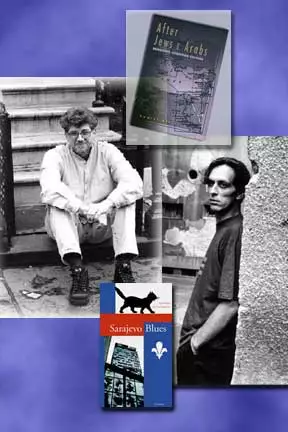home
P O E T R Y C E N T E R 2 0 0 1

The Poetry Center & American Poetry Archives in collaboration with Ivri-NASAWI present
Two events with visiting writers
Semezdin Mehmedinovic & Ammiel Alcalay
Thursday March 1, 7:30 pm
$5 donation @ The Unitarian Center1187 Franklin (at Geary)
Also, Thursday afternoon March 1, 4:30 pm
free public conversation @ The Poetry Center (SFSU)Contact: Steve Dickison at the Poetry Center (415) 338-3401
or Jordan Elgrably at Ivri-NASAWI (323) 650-3157
Bosnian poet, writer and filmmaker Semezdin Mehmedinovic was born in Tuzla, Bosnia, in 1960, and is the author of four books. Sarajevo Blues--"widely considered here to be the best piece of writing to emerge from this besieged capital since Bosniaís war erupted" (Washington Post)--was written at the height of the war that destroyed Sarajevo, and was published outside the country in Ljubljana, then, in English translation by Ammiel Alcalay, in the US by City Lights Books in 1998. Mr. Mehmedinovic, his wife, and their child came to the U.S. as political refugees in 1996. He lives and works in Washington, DC.
Writers in Bosnia-Hercegovina (PEN)
It is not only my world that has been deconstructed but the meanings of words as well. A "library," for example, is no longer a building filled with books but a burned-out ruin."Semezdin Mehmedinovic
Before the war, Bosnia boasted a vibrant literary community; Sarajevo was a melting-pot of writers, poets, and essayists from different backgrounds, and writing was an art cultivated by nearly all intellectuals. (Radovan Karadzic, for instance, was a well-received author of children's books and poetry before he turned to nationalist politics.)During the war, writers had three choices: to leave, if a way could be
found (often it could not); to join a political party; or to remain in Sarajevo under siege. In these circumstances, many writers chose not only to stay but also to make their more tolerant viewpoints known. They banded together in Sarajevo and formed a Bosnian PEN, which was open to all writers whatever their ethnic origin.Today, much of Bosnia's literary community remains dispersed. Those still in Bosnia face continuing economic hardship. They live without properly-stocked libraries and book stores. The publishing infrastructure has yet to be restored.
Ammiel Alcalay has become among the most exemplary US writers of his generation. Poet (the cairo notebooks; A Masque in the Form of a Cento), activist, widely-recognized scholar and essayist (After Jews and Arabs: Remaking Levantine Culture; Memories of Our Future: Selected Essays), anthologist (Keys to the Garden: New Israeli Writing), and prolific translator from Serbo-Croatian, Hebrew, Arabic, Spanish?his recent work has been focused particularly on Bosnia and the Middle East. His work-in-progress includes the book From the Warring Factions. One of the original members of the East for Peace movement and NGO in Israel in the 1980s, he has also done a variety of human rights work for Amnesty International, the Palestine Human Rights Data Base and other organizations. Along with Jordan Elgrably, Ruth Behar and Victor Perera, he is one of the co-founders of IVRI-Nasawi, the New Association of Sephardi/Mizrahi Writers International. Currently a visiting scholar at Stanford University, Mr. Alcalay lives in Brooklyn, New York, and teaches at Queens College, CUNY.
"Sarajevo Blues is at once a battle report and a philosophical investigation. In poems, micro-essays, and prose vignettes, Semezdin Mehmedinovic charts the collapse of a world with heart-breaking clarity and precision. His book conveys the same clear-eyed passion for the truth that one finds in the young Hemingway, the Hemingway of In Our Time."
Paul Auster
"Few contemporary intellectuals can boast of as diverse a range of skills as Ammiel Alcalay. His work is cosmopolitan in the best sense: in an epoch of superficial globalism his approach to the cultures he deals with is always rigorous, always meticulously respectful of particularities and differences. There is no one better qualified to explore the meaning of todayís 'culture wars,' locally and globally.""
Amitav Ghosh
home